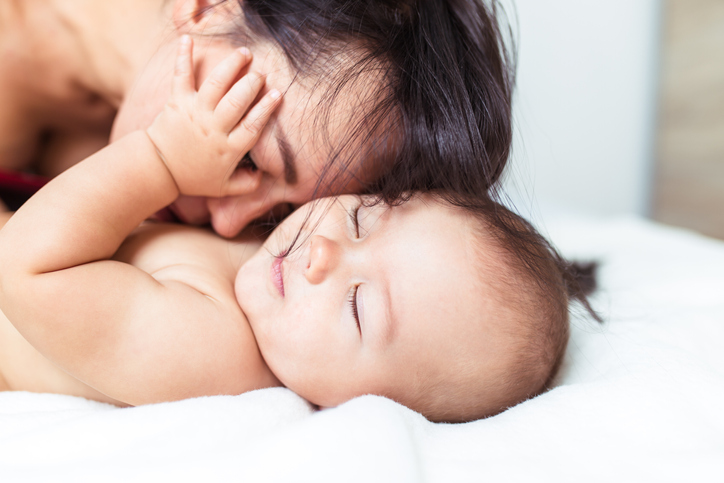When my twin boys were babies, I was understandably overwhelmed. Just making sure they were fed and clothed and clean was a juggling act, so much so that I often felt like I was barely surviving. I also was consumed with guilt, concerned that this splitting of my energy between two babies, meant that neither one of them was getting enough snuggling or support.
Ultimately though, I realized that it didn’t matter if my twins had to share one mom, as long as they were both getting all of the nurturing and love that I had to give. I took every opportunity that I could to have one-on-one snuggle time with each boy, resting my cheek on the top of his head, and feeling his baby breath on my chest. Sometimes, I would try to hold them both in my arms, but that was challenging. Often, I would put one on an infant lounger pillow and lean in, cradling my arm around him, while I held his brother in my other arm. I so wish I could go back in time to those peaceful moments, where my little guys actually let me hug and kiss them.
Our hug time was everything to me! I was able to create calm in the whirlwind of twin parenting, and really be there for my babies simultaneously. And I’m grateful, because there are some very powerful benefits of hugging — both for you and baby.
1. Hugging reduces your baby’s stress hormones. And, your baby’s body functions better as a result. “Comforting contact stabilizes his heart rate and blood glucose levels, in a way, really calming all of his systems,” says Lori Feldman-Winter, MD, a New Jersey-based pediatrician and member of the American Academy of Pediatrics’ Task Force on SIDS.
2. It helps you feel calmer, too. Your baby isn’t the only one reaping the benefits from all of this comfort. “We all thrive from interactions that make us feel engaged, safe, and loved,” explains Laura Jana, MD, an Omaha-based pediatrician and author of The Toddler Brain. “The benefits of hugging are not just one-directional, but are based on a two-way sense of connectedness.” Which brings us to our next point…
3. Cuddle time can help boost your breast milk supply. Stress can deplete your breast milk supply. Hugging can help combat stress. “The hormones released in the brain during hugging, especially skin-to-skin, relax the mind and body, which in turn, supports lactation,” explains Kristi Watterberg, MD, professor of pediatrics/neonatology at the University of New Mexico, and Chair of the AAP’s Committee on Fetus and Newborn. “Just sitting there under a warm blanket, holding and rocking your baby, can help boost milk production.”
4. Hugging benefits your preemie’s (or micro-preemie’s) overall health. “Human touch, particularly skin-to-skin care, is crucial for a premature baby’s health because it helps to synchronize heart rate and calm breathing, which increases the baby’s oxygen saturation,” says Dr. Watterberg.
5. Regular close contact makes you more responsive to your baby. According to Dr. Feldman-Winter, research shows that mothers who frequently hold their babies are more responsive to their baby’s cries. “Maternal touching of all forms, especially affectionate hugging, is a method of maternal-child communication, which connects mom to baby,” she says. “It’s biological and evolutionary — nature’s way of ensuring that parents are instinctively protecting their children.”
6. Cradling your baby in your arms makes her feel more confident. There is no such thing as hugging a child too much. Some parents falsely believe that holding a baby too much makes her needy, but that’s a myth. You can’t spoil a baby, says Dr. Feldman-Winter. “In fact, when you hug your baby, you make her feel safe and secure, like her needs are being met, which in turn, grows her sense of independence and confidence as she get older,” she adds.
7. Hugging boosts brain development. Unlike other forms of touch, hugging sends a clear subconscious message to babies. “A hug physically conveys warmth and security, and lets the baby know they’re being loved and cared for,” explains Dr. Jana. “There is lots of compelling research on what factors are critical to a child’s brain and emotional development, and the single most important factor is the strong relationship with a caring, nurturing, responsive adult.” Hugging is the earliest expression of that.
8. It regulates a baby’s sleep patterns. This same sense of security and confidence, also allows her to sleep better as well. It sounds cliche, but baby can truly “sleep easier” knowing that she is being cared for, which helps establish more routine sleep cycles, explains Dr. Feldman-Winter.
9. Snuggling up together will help reduce your baby’s pain. Studies have found that snuggling, particularly skin-to-skin, decreases a baby’s pain, and consequently, his crying. In older babies, research found that hugging can even minimize the pain or fear from shots or having blood drawn, says Dr. Feldman-Winter.
Photo: Getty
